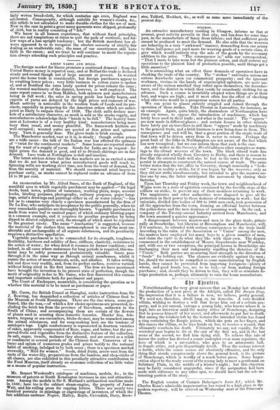LINEN YARNS AND MILLS.
The foreign market for linens promises a continued demand : from the United States money is reported easy, and at Belfast the trade is declared steady and sound though not of large amount at present. In worsted yarns the home trade is considerable, but foreign purchasers appear to be awaiting lower prices ; very little business in cotton yarns is spoken of, and at Bradford the rates lately quoted for prices remain the same ; the worsted machinery of the district, however, is well employed. The same report comes to us from Halifax, both spinners and manufacturers being in full work ; the sales in spring goods has hardly begun, and exports of yarns are delayed by the high prices and rumours of war. Much activity is noticeable in the woollen trade of Leeds and its pre- cincts, especially in preparing for the American orders which are antici- pated as likely to surpass those of 1858. The cloth mills declare mar- kets of a satisfactory character, as much is sold as the stocks supply, and manufacturers acknowledge their "hands to be full." The hosiery busi- ness at Leicester is of a very healthy kind; manufacturers being more busy than usual, and money plentiful. The framework knitters are well occupied ; worsted yatns are quoted at firm prices and spinners bug. Yarn is generally dear. The glove trade is brisk enough.
The Manchester market, vast as it is, is steady; though cotton prices are a trifle easier : the talk of the Italian war has affected the spinners of "twist for the continental markets." Some looms are reported stand- ing for want of a supply of yarns. Goods for India are in request : for light prints the demand is good, and 45 to 50-inch shirtings are in fair demand. Lace trade at Nottingham is dull and inactive.
The latest advices delare that the flax markets are in so excited a state that we do not know what prices manufactured goods will reach to. Spinning mills are working short time, not from the want of demand, but from the scarcity of material. We should recommend retail buyers to purchase early, as stocks cannot be replaced under an advance of from 15 to 20 per cent.


























 Previous page
Previous page